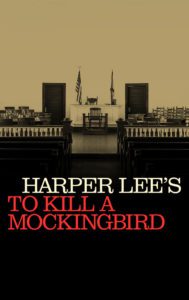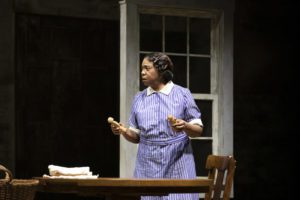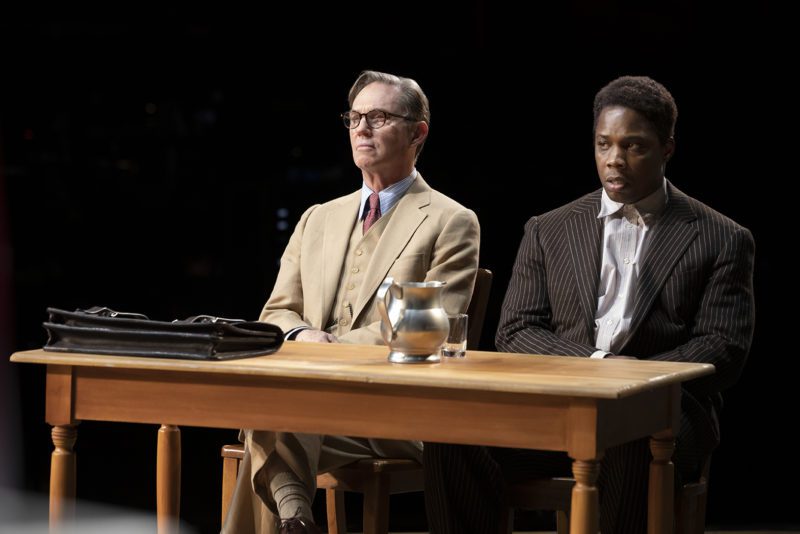SALT LAKE CITY – On February 23, 2020, a black man named Ahmaud Arbery was shot dead by a group of white men while he was on a Sunday jog through his neighborhood. On March 13, 2020, a black emergency room technician named Breonna Taylor was shot five times by police officers in her own bedroom. She was finally given medical attention only after her boyfriend called 911, at which point she was already dead. On May 25, 2020, a black man named George Floyd had his neck pinned to the ground by a police officer’s knee for eight minutes straight, losing consciousness and dying shortly after. Both Ahmaud Arbery and Breonna Taylor were completely innocent. George Floyd’s crime was using an alleged counterfeit $20 bill at a convenience store, for which he was brutally and inhumanly suffocated on a public street.

To Kill a Mockingbird at the Eccles, a new play by Aaron Sorkin, demands change. Using the riveting phrase “all rise” as a call to action for every person present, Sorkin’s version of the play makes it clear that the mistreatment of Black Americans in our country is everyone’s responsibility.
Based on Harper Lee’s groundbreaking novel To Kill a Mockingbird, this new play brilliantly portrays dark realities of the 1930s in the deep south while making chilling connections to today. Yet, this nostalgic story for many Americans remains true to the novel and film. In fact, the actress who played Scout in the film, Mary Badham, has returned to the same story 60 years later to play the role of Mrs. Henry Dubose. Additionally, the dearly beloved characters Scout, Jim, and Dill are even more prevalent, now narrators for the entire plot, frequently adding tender moments of humor and lightheartedness. Atticus remains wise and noble, but his imperfections are refreshingly explored and his morals questioned. Sorkin succeeds in both honoring these treasured characters while still allowing them to be products of their time, as we all are.
 Direction by Bartlett Sher is powerful and brilliant. When Atticus is giving his final pleas to the jury in defense of the wrongly accused and inherently virtuous Tom Robinson, actor Richard Thomas (playing Atticus Finch) suddenly turns towards the audience. In a magnificent and moving moment, Atticus begs the audience for justice with trembling hands and tired, earnest eyes. Another compelling moment of the production is when Tom has unexpected visitors at the jail. The suspenseful silence is broken when eerie figures with bags over their heads enter, stepping with a chilling slowness, making sound only with the chains in their hands. This moment sent the hair straight up on my arms, and I clutched my partner’s hand. Sher’s vision is effective, poignant, and unapologetically direct.
Direction by Bartlett Sher is powerful and brilliant. When Atticus is giving his final pleas to the jury in defense of the wrongly accused and inherently virtuous Tom Robinson, actor Richard Thomas (playing Atticus Finch) suddenly turns towards the audience. In a magnificent and moving moment, Atticus begs the audience for justice with trembling hands and tired, earnest eyes. Another compelling moment of the production is when Tom has unexpected visitors at the jail. The suspenseful silence is broken when eerie figures with bags over their heads enter, stepping with a chilling slowness, making sound only with the chains in their hands. This moment sent the hair straight up on my arms, and I clutched my partner’s hand. Sher’s vision is effective, poignant, and unapologetically direct.

Scenic design by Miriam Buether left me breathless. The Finch family porch is created without a wall; two white columns frame a rustic wooden porch, a homey window pane, and a door frame, all crowned with floating, delicate roof. This design is flawlessly complimented by lighting design by Jennifer Tipton. A vibrant, cascading tree branch graces the top of the stage, its wavering shadows immersing the stage into the hot summer night.
As Atticus Finch, Thomas is everything Harper Lee’s readers would want him to be: noble, steadfast, and high-spirited. Thomas speaks with the warm, comforting confidence that only a dad could have. Melanie Moore as Scout is a delight, flying across the stage with unrestrained curiosity and childlike movements. Yaegel T. Welch has opened his heart for all the world to see as Tom Robinson. Welch’s sincerity echoes through the theater with each word and soft sob. Jacqueline Williams as Calpurnia also provides an impeccable performance. Williams delivers some of the most timely and impactful lines of the show, such as “They say what doesn’t kill you makes you stronger, but what about what kills you?” This material is more personal and painful to the Black members of this company than I can even imagine, as a white, very privileged young adult. These actors give the world such a priceless gift by engaging in such vulnerable, impactful material. Thank you.
To Kill a Mockingbird at the Eccles is a nostalgic, heart wrenching journey that cuts to the core. While the exact content may be sensitive to younger viewers, the crucial messages this production so powerfully portrays are essential for communities, work environments, congregations and families. Sorkin’s play will not only cause audiences to marvel at this nation’s malicious history, but also realize that we are not yet far from it. As Atticus pleads to his courtroom and to every viewer in the audience, “Let’s begin with justice.”
[box]The national tour of To Kill a Mockingbird plays at 7:30 PM on September 7, 8 PM on September 9, 2 PM and 8 PM on September 10, and 1 PM and 6:30 PM on September 11 at the Eccles Theater (131 South Main Street, Salt Lake City). Tickets are $45-$199. For more information, visit saltlakecity.broadway.com.[/box]

